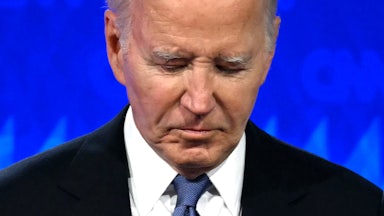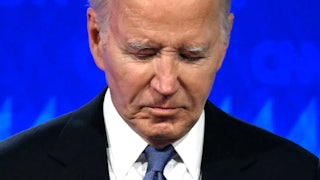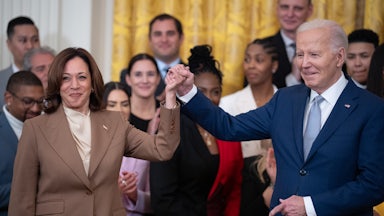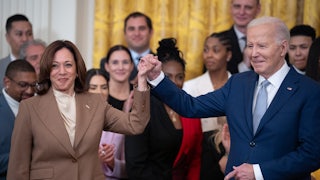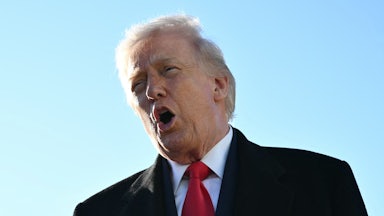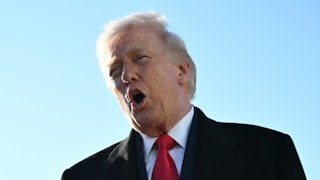If it’s caught early, before it’s had the chance to spread to other parts of the body, 99 percent of patients with cancer of the prostate go on to live at least another five years. Once it’s metastasized, the five-year survival rate drops substantially; down to 32 percent. Even with an intensive treatment regimen—lowering testosterone, radiation, chemotherapy—it’s likelier than not that they will pass before long.
All this is being said here not to elicit sympathy for Joe Biden but to underscore a simple point: Undiscovered or left unaddressed, the things that ail us—people, systems, or institutions—will work their way to bone. And when they do, there are no straightforward treatments. There are no easy cures.
The Democratic Party is sick. Most Americans disapprove of it. Only 35 percent of Democrats are optimistic about the future of the party. In November, the Republican Party won its first presidential popular vote victory in 20 years. For the second time in the last decade, the GOP now has full control of the federal government. Its agenda is fascism.
There is faith among elected Democrats that the backlash to Trumpian misrule alone could deliver them at least the House in the midterms. That may well happen. But the Senate map will be difficult in 2026. It will be difficult in 2028. It will be difficult in 2030. It will be difficult, in fact, for the foreseeable future because Democrats are no longer competitive in conservative-leaning states, which the Senate is skewed to overrepresent, a problem that will only grow with population shifts over time. This is among the reasons why, beyond Washington, the Republican Party now fully controls government in 23 states to the Democratic Party’s 15.
Since 2016 especially, there have been many deep and depressing conversations, covered and carried in this magazine, about how Democrats got here. The forces and factors weakening the party have been debated. Chins have been stroked red and raw over the constituencies the party has lost and how it might win them back. Historians, political scientists, political professionals, and journalists have all chimed in about how the party might be fixed, about what ought to be done and why. But within the last week, the political press seems to have settled easily upon the issue that evidently ought to be at front of mind for us all: The first and most significant problem facing the Democratic Party today, it seems, is that Joe Biden ran for reelection.
“A growing number of Democrats are publicly second-guessing their party’s handling of the last election,” The Washington Post reports, “acknowledging that President Joe Biden’s delayed withdrawal was damaging and in some cases conceding they were too quick to dismiss questions about his age and mental acuity.” The Post’s Megan McArdle is “convinced that deep institutional soul-searching is due in many quarters, and that this conversation is too important to delay, even at the risk of adding to the Biden family’s distress.” Van Jones believes that Democrats “are going to pay for a long time for being a part of what is now being revealed to be a massive cover-up.”
On Friday, Politico’s Adam Wren and Holly Otterbein put out a piece on “the Biden question hanging over the 2028 field.” “Joe Biden may have cost Democrats the White House in 2024,” it begins. “Their inability to admit it, some Democrats fear, could hobble them in 2028.” The New York Times similarly tells us that influential Democrats have “urged the party to publicly reckon with their long-running support of him.”
The 2024 election was more than half a year ago. Joe Biden dropped out of the 2024 race last July. Why, exactly, have the press and nervous Democrats returned to the subject of his run now, all of a sudden and all at once? On Monday, The Wall Street Journal reported that “Biden dominated the national political conversation this past weekend,” adding that “continued questions” about Biden’s health and decision to run “are emerging as both a major distraction and a litmus test for [the] party’s leaders.” This is the kind of language that describes the trajectory of bullets in police shootings. “Continued questions” from whom? “Emerging” from where? Is it actually the case that Biden’s health and decision to run “dominated” political conversation across the country this weekend—more than, say, the price of goods or the current president’s immigration policies? Have any polls been released to that effect?
Granted, it is almost a certainty that we’ll get polls, very soon, showing that voters are thinking actively about Joe Biden again. And this is because political journalists want that to be the case. There’s a book out on him, Jake Tapper and Alex Thompson’s Original Sin, with new revelations on how infirm he was well before his reelection campaign began. He forgot names and faces, it tells us. There was talk about putting him in a wheelchair.
“A theme throughout the book is that people who had not seen Mr. Biden in person for a long time were shocked by his appearance when they did,” The New York Times’ Reid Epstein wrote earlier this month. “Former Representative Brian Higgins, a Democrat from New York, is quoted in the book as saying that Mr. Biden’s possible cognitive decline ‘was evident to most people that watched him.’ David Morehouse, a former Democratic campaign aide turned hockey executive, said Mr. Biden ‘was nothing but bones’ after seeing him in a photo line in Philadelphia.”
What makes these accounts and the frenzy around them now so remarkable is that Biden’s state was evident to anyone with eyes and ears. The American people might not have had the details, but they also didn’t need them. It was obvious that his advancing years would make another campaign and term difficult—so obvious that it was raised as an issue more than five years ago, before his run in 2020, by Biden’s critics to his left and the mainstream press alike. It was reported at the time that Biden’s confidants did not want him to run for reelection if elected and did not believe he would. Once in office, he cruised into another campaign anyway before last June’s debate brought everything to a grinding halt.
Or, at least it should have. Biden’s campaign sputtered on for weeks after the debate, during which many of the voices that whispered their regrets to Tapper and Thompson—or are crying out publicly for a reckoning now—either said nothing or actively defended Biden’s capacity to run. Why? Biden, they contend, held the party hostage. “It is a long tradition for Washington bigwigs to use books to place the blame squarely on someone else,” Epstein wrote. “What’s unusual about this book is that just about all players who agreed to be interviewed—200, the authors wrote—pointed the finger at Mr. Biden and his small circle of senior aides.”
But this is both an oversimplification and a misdirection. Democratic leaders, insiders, and pundits did, ultimately, succeed in pushing Biden out of the race and clearly could have done so earlier—Biden and his circle were no match for most of the apparatus of the Democratic Party acting in concert. It was that apparatus, actually, that carried Biden to the White House as the Democratic nominee in the first place, as party leaders and candidates—again, belatedly—coalesced to put Biden, the unsatisfying but safe choice in their eyes, firmly ahead of Bernie Sanders during the 2020 primary. They swallowed the risk of Biden’s age to do so, assuming a second run was out of the picture.
That collective decision to rescue and elevate Biden has to be among the reasons they were hesitant to call him to step aside early on, even as it became clearer that he was serious about reelection—a movement to discard Biden early in his term would have underscored the cynicism of propping him up temporarily as a placeholder. There were other reasons—the fear of a chaotic change-up or primary damaging the party’s chances against Trump, yes—but also the fear, among Democrats looking out for themselves, of having made an enemy of Biden in the event that he actually won reelection.
All told, Biden was able to pursue another campaign out of Democratic deference, careerism, and complacency. There was no spell he cast over the party; nothing he himself did to stupefy and paralyze its leaders. Up and down the ladder, the shrewd and the merely timid, all of whom knew full well that he shouldn’t run again, each took measure of the situation and figured it was safest to do nothing until doing nothing became untenable—and for several weeks afterward.
Prominent Democrats speaking out about all this a year ago would have been meaningful. Today, it means nothing. Denouncing Biden’s run now that he’s a political nonentity—out of office and perhaps very near death—isn’t taking a brave stand against the internal culture of the Democratic Party. It’s a reflection of it: a wholly cost-free and substantively empty way for opportunists to perform independence from the party now that the coast is clear and there are no toes of consequence to step on. Biden ran again, and is being condemned for running again, for the very same reasons.
To suggest otherwise is to misunderstand both the nature of the Democratic Party and the nature of political courage. “The Biden recriminations could provide an opportunity for Democrats countering party orthodoxy on the issue,” Wren and Otterbein wrote in their piece: “In the same way Barack Obama gained credibility with some Democratic primary voters in 2008 by having opposed the Iraq War long before his party consensus shifted, some Democrats think a willingness to break from the field on Biden could open the door to an outsider candidate.”
It’s a revealing comparison. Speaking out against Biden’s reelection campaign, as a matter of substance, is obviously nothing like having spoken out against the Iraq War. But even beyond that, the reason why Obama’s opposition to the war resonated to begin with is that he thought the war was a mistake from the outset and said so publicly when it was politically risky to do so—not just in hindsight like his opponents in that race, who had to explain themselves. It was almost exactly the opposite of what Democratic candidates are being urged to do now. Voters will be able to tell the difference.
Party hopefuls looking for ways to mark themselves as different from the rest of the pack today have other, better options. The best way to demonstrate a measure of real independence from the Democratic Party is to tell the truth about what really ails it: wealthy, clueless donors; an approach to public policy incommensurate with the scale of the challenges the country faces; a quasi-religious faith in the virtues of bipartisanship; a related and willful blindness to the depths of the Republican rot beyond Donald Trump; and a blindness, just as consequential, to the structural features of our federal system that will continue pulling governance to the right. All are much deeper problems than Joe Biden’s ego and those who chose to flatter it. All will be much more difficult to resolve. But if Democrats are looking for a reckoning, there are quite a few to be had in that mix.

